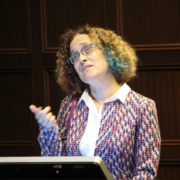“What if Zora Neale Hurston never studied with Franz Boas? Facing the Settler Colonial Legacy of North American Ethnomusicology”
In recent years, North American ethnomusicologists have been calling for a reassessment of African-American writer Zora Neale Hurston’s role as a pioneer in the development of their discipline. Their appeals echo those of Black anthropologists and feminists over the past few decades, many inspired in turn by Alice Walker’s sensational rediscovery of Hurston within the feminist and Black civil rights context of the mid-1970s. These scholars frequently interpret Hurston ethnographic method based on the assumption that she studied with the renowned “founder of American Anthropology,” Franz Boas—a biographical detail they cull from Robert E. Hemenway’s classic biography of Hurston from 1977, which in turn is based on Hurston’s own semi-fictionalized autobiography, Dust Tracks on a Road, of 1942. A passage from Dust Tracks leads many of them to assume that Hurston refuted Boas’s teachings—a thesis that allows them to position her as a trailblazer of black feminist ethnomusicology and anthropology.
In the course of Tamara Levitz’s preliminary research on this project, she discovered that Zora Neale Hurston never studied with Franz Boas, however, and that the narrative of her opposition to him serves primarily to bind her to white spaces, and erase black history. Eager to correct this historical mistake, she investigated every school Zora Neale Hurston attended from the age of 6, filling in the gaps about her allegedly “lost” years in Florida, and documenting the 18 months Hurston spent as a domestic maid with a “Gilbert and Sullivan” company. This work allowed Levitz to understand her unique musical experiences and contributions as a Black domestic worker in the Jim Crow south—a topic that has been fully ignored, even in the Hurston literature.
With a Faculty Research Grant from the CSW, Levitz will complete this project by making last archival visits to Barnard College, Vassar College, and Howard University. She hopes to learn more at Bernard about admissions policies for Jewish and Black students, and about Hurston’s time there. Levitz will visit Howard to explore documents relating to Hurston’s teachers Dwight O.W. Holmes and Lorenzo Dow Turner as well as the the archives of Hurston’s teacher Ruth Benedict at Vassar College.
Levitz hopes with this research to raise consciousness about traditions of black excellence in music education that continue to be ignored in white spaces, and about the experiences of black domestic workers as students in the settler colonial school system of the post reconstruction era in the United States.
Researcher
Tamara Levitz
Tamara Levitz is a musicologist from Montréal, Canada who currently holds a position as Professor of Musicology at UCLA in Los Angeles, California. She has published widely on musical modernism in Germany, Cuba, Senegal, and France in the 1920s and 30s. Combining extensive archival research with acute critical interpretation, Levitz explores in her work the artistic intentions, complex motivations, sexual and gender identifications, and intricate social relations of musicians, composers, critics, ethnographers, performers, and audiences involved in historical events of musical performance.



